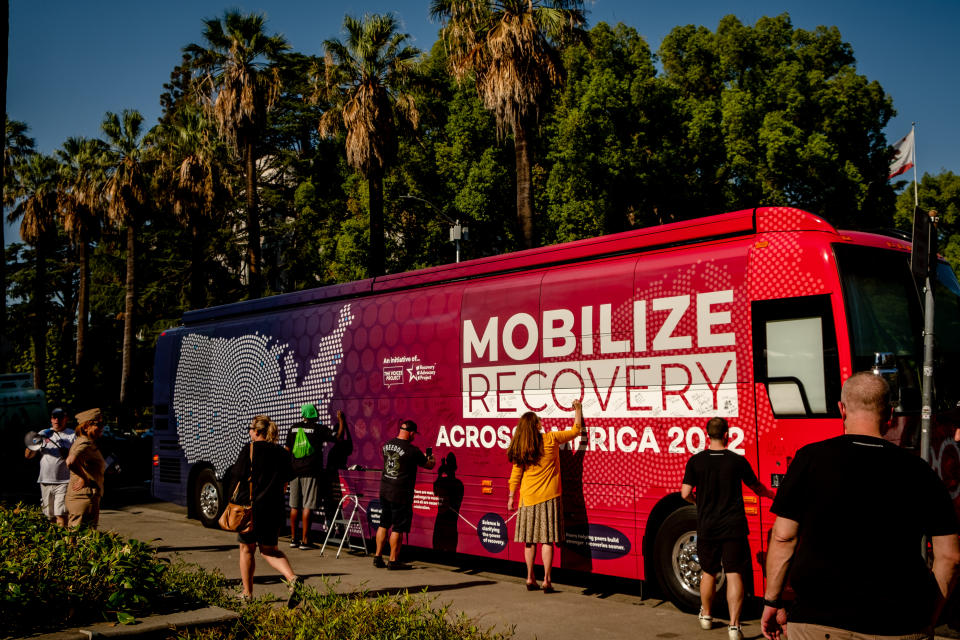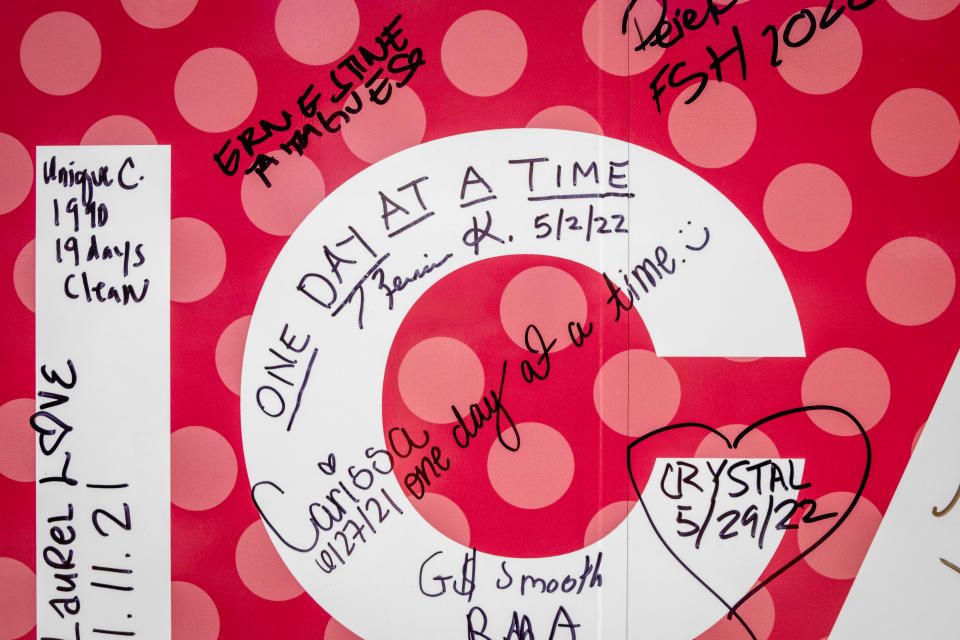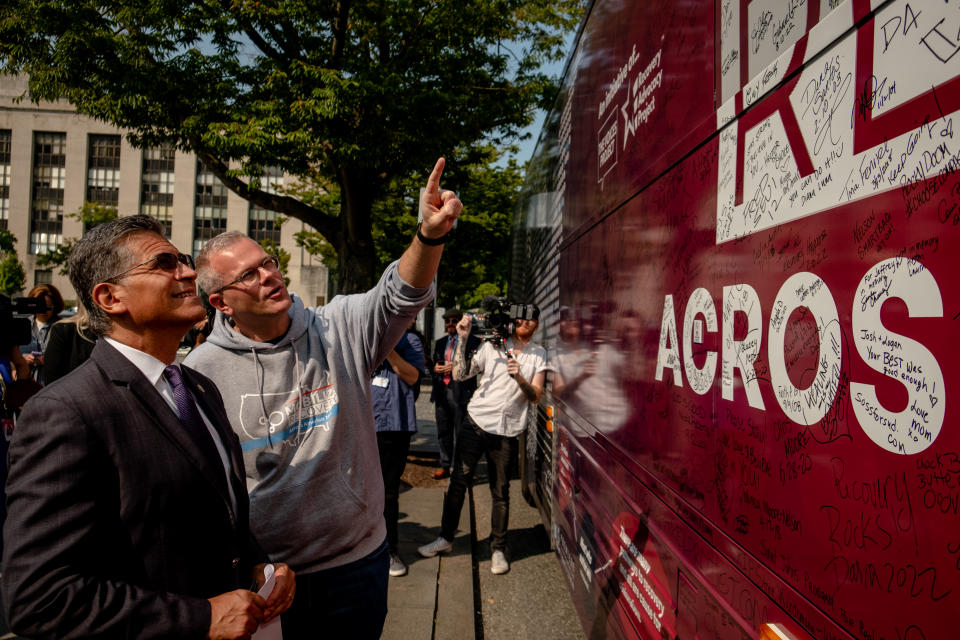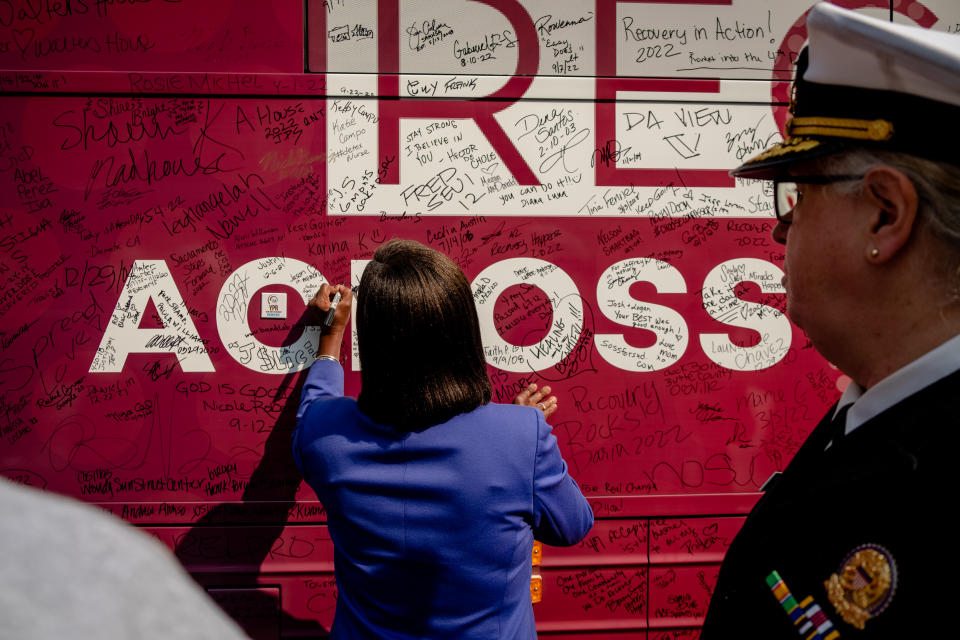Advocates Honor Recovery Month With a Nationwide Bus Tour

No matter where you are in the United States during National Recovery Month, you may spot an unusual sight: a red bus, covered in names.
The bus, organized by Mobilize Recovery, an advocacy group that pushes for evidence-based substance use treatment methods, is stopping in 27 communities across the country throughout September, meeting up with state and local leaders in the field and connecting with people in recovery everywhere.

"When I first came into recovery, I was very quiet, ashamed. I didn't know that I even had rights, that I could speak out and advocate for things," said Garrett Hade, a co-founder of Mobilize Recovery and co-organizer of the bus tour. "I didn't know that my voice made a difference ... As part of this bus tour, we're trying to be a powerful, collective force for action."
The advocates aboard the bus and meeting Mobilize Recovery in the field do a little bit of everything: Some, like Joseph Green, a spoken word artist, use storytelling workshops to push for community engagement. Others, like End Overdose’s Theo Kryzwicki, share a message of harm reduction and make sure that people have the tools and training to reduce overdoses, which have risen to historic levels.
Courtney Gary-Allen, the organizing director of the Maine Recovery Advocacy Project, makes change at the state level by lobbying for policies like strengthened Good Samaritan laws, and even more advocates, like Patti Vargas, serve as voices for families impacted by the overdose epidemic.
"We're bringing all these people together and seeing information and knowledge from communities across the country and saying 'How can we make this better in our community?'" Hade said.
No matter how they work, though, each person on the bus tour has one goal: To help people enter recovery from substance use, however that recovery might be defined and whatever it might entail.
Many of the advocates on the bus are in recovery themselves. Mobilize Recovery’s co-founders, Hade and Ryan Hampton, are both about seven years sober, while some members of the tour have been in recovery for decades. Meanwhile, the people greeting their tour are in various points on the recovery spectrum.
"Every place we've gone, there have been people in the audience for these trainings who are fresh in recovery. Some of them it is their first day," said Green, who has been at three tour stops. "There was one young lady who had 23 days (sober), because she kept saying it. ... This bus has been a shining beacon, going throughout the country. (People) have been drawn to this bus as a symbol of 'this is what recovery can really look like.'"
The tour stops, Hampton and Hade said, have been met by large groups of people, ranging from around 300 attendees in Manitowoc, Wisconsin to about 3,000 people at a stop in California. The interest in the tour, Hampton says, reflects the changing attitudes of the nation where nearly a third of people say drug use has impacted their family.
“I’ve been very intentional in spending some time with the bus, and it gets me super emotional, because you go around that bus and you look at it and you see the names of people you know and love that are on it,” Hampton said. “But you also see the stories and names of people writing 10 days sober, 50 days sober. It just gives you a tremendous amount of hope that people are looking for something different, they want to be involved, and they’re ready for a change.”

It's not just the general public showing up at these events, the advocates said. At some stops, local and state leaders have been on the schedule. In Kentucky, governor Andy Beshear was in attendance at an event organized by two workers' unions, and in New Jersey, the bus tour met with Patrick Kennedy, a politician and mental health advocate who has been involved in initiatives combatting the overdose epidemic. Recently, the group even met with Xavier Becerra, the head of Health and Human Services. By interacting with political leaders, recovery advocates hope to have a voice in shaping policy and the public treatment of people who use drugs.
"Secretary Becerra was asked a question about the barriers to implementing (a new federal funding policy) and instead of him answering the questions, he pivoted to us," said Hampton. "He said, 'Why don't you ask the advocates what the barriers to implementation are?' And we had the answer."

In addition to interacting with politicians and communities, the tour has also brought harm reduction techniques across the country. Naloxone is distributed, fentanyl testing strips given out and teaching sessions are given so that people who use drugs can stay safe.
"(On one stop), there was someone who was not experiencing an overdose, but was unresponsive, and people with them came to us and said 'Do you mind checking on my friend over there? I'm not sure if he's OK,'" recalled Hade. "That was extremely powerful. People look after one another. They're watching each other's backs. They come up to us and say 'Can I have extra naloxone?' They're carrying it, and they're (aware of) how to use it."
The bus tour will continue through September. Some people who spoke with TODAY will be following the tour the whole time, while others were only in attendance for a few stops and are now back in their own communities. For each of them, the bus tour has changed their idea of what Recovery Month can look like and mean.
"It's evolved, not just to be a month to have actions, but to be a month to really engage people and build out strategy," said Aaron Kucharski, a grassroots advocacy trainer for the Recovery Advocacy Project. "Nobody in this movement can afford to be quiet anymore."
"This is no longer just about awareness," added Gary-Allen. "We all collectively hold quite a lot of grief and mourning ... I think we are all very aware that our friends are dying and that we're in recovery. Recovery Month is a direct call to action."

Hampton said that he, Hade and the rest of Mobilize Recovery are "absolutely" planning to do another bus tour in the future.
"Discussions are already taking place," Hampton hinted.
Until then, he and other advocates will continue to meet people in recovery where they are, a popular statement in harm reduction and recovery spaces that aims to help people collaborate, instead of insisting on one solution.
"It's my hope that (this community building) continues past Recovery Month," said Hampton. "This month of action, which is really how I view it, can be something that continues every single day of the year, until we get to a place where we're not watching historic overdose numbers continue to rise. ... I truly believe in the power of this community, and this tour has just represented an extraordinary amount of hope."
This article was originally published on TODAY.com

